Table of contents
This is the fourth post in the series about effortless performance improvements in C++. Check the first post to get the full story!
Last
time
we added a call to std::vector::reserve in tokenize to preallocate
the memory we needed, and got 15% performance improvements. After
these changes we observed that the tokenize function was still a top
hotspot, mostly due to calls to std::string(const std::string&) and
std::string::substr(). How can we improve that?
What’s an std::string anyway
In short, std::string is a fancy std::vector<char>, with a similar
reallocation policy. Regarding allocations, std::string has an extra
feature in the form of the Short String Optimization (SSO) which
allows not to use dynamic allocations for relatively short strings
(around 20 characters or less).
It is very easy to produce many, many, maaaaany, allocations when operating on strings. Let’s unroll a small example to better understand what is going on (ignoring SSO for didactic purposes). Consider the following code:
std::string s1 = "something";
std::string s2 = "this";
std::string s3 = s2 + ' ' + s1.substr(4); // "this thing"
Only three statements, let’s see what is going on behind the scene. If
m_data is the pointer to the buffer inside std::string, we can
track the allocations and copies with the following drawing.
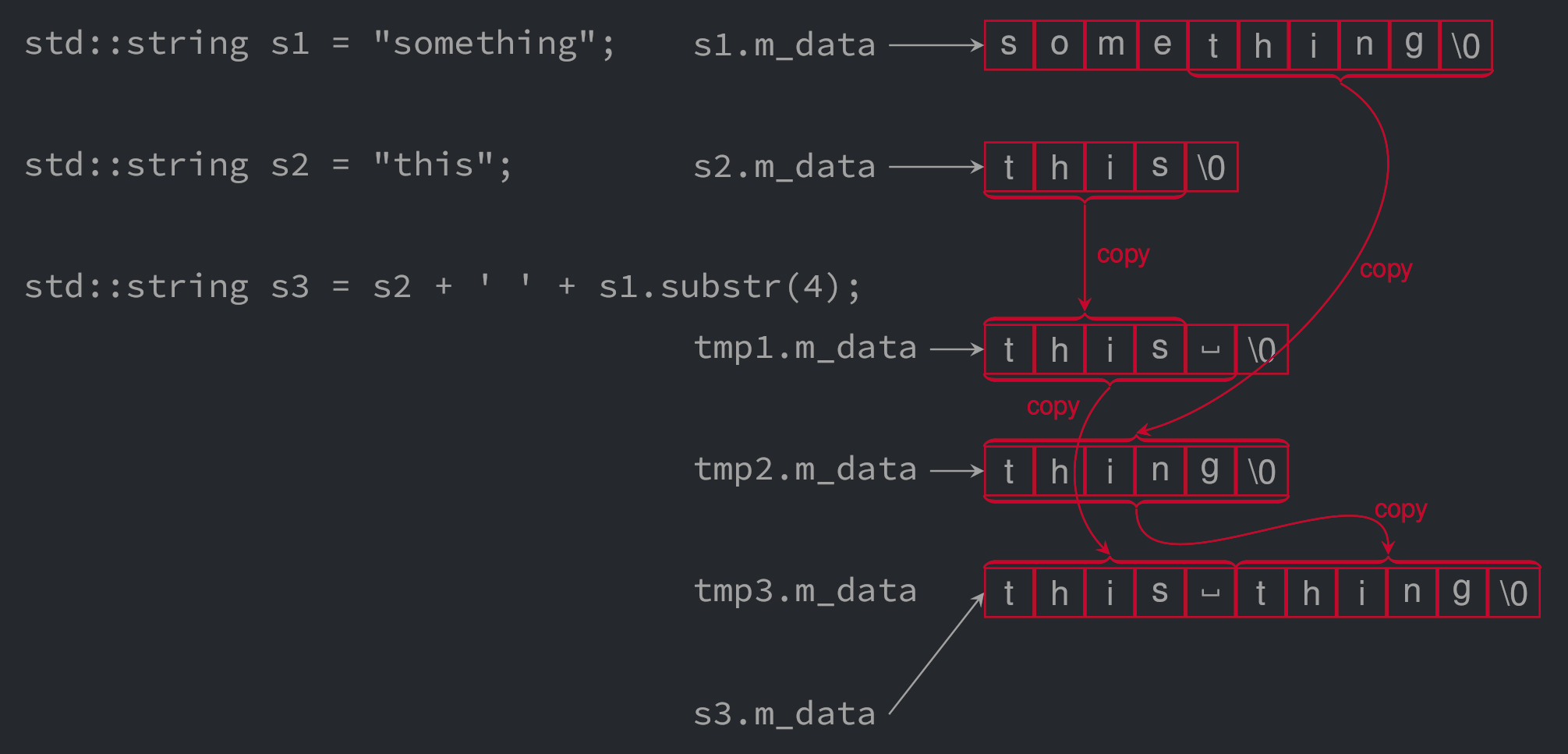
Let’s begin with the initialization of s1. In order to put the
C-string “something” into s1 there is an allocation for s1’s
internal buffer, then the C-string is copied into this buffer.
The same goes for s2: one allocation for the buffer, then one copy
of the C-string (again, without considering SSO).
Things become a bit more complex for s3. First, a temporary string
tmp1 is created to store the concatenation of s2 and a space. The
internal buffer of the temporary string requires an allocation, then
s2 is copied into the buffer, and finally the space and the null
character are added at the end of the buffer.
Second step, the call to s1.substr(4) creates another temporary
string tmp2. Again, an allocation is done for its internal buffer,
then the sub-string begining with the fifth character of s1 is
copied into tmp2.
Last step before the assigment, tmp1 and tmp2 are concatenated. A
new temporary string tmp3 is created to receive the result, with an
allocation for its internal buffer. Then tmp1 is copied in tmp3,
followed by tmp2.
Finally, the internals of tmp3 are moved into s3.
All in all, behind these three statements, we had five dynamic
allocations, and six calls to strcpy.
Avoiding string allocations and copies
Just like with std::vector, an easy solution to save on allocations
is to call std::string::reserve() and allocate once and for all
before filling the string. It won’t help for temporary strings
though. The other key is to use std::string::operator+=() to
concatenate inplace. When these rules are applied to the previous
example the code becomes:
std::string s1 = "something";
std::string s2 = "this";
std::string s3;
s3.reserve(11); // Large enough to contain the final string.
s3 += s2; // Append inplace, no allocation.
s3 += ' '; // Append inplace, no allocation.
s3 += s1.substr(4); // Append inplace, no allocation.
Additionally, our program can benefit from std::string_view,
provided by the standard library since C++17 (if you cannot use C++17,
know that there are many standalone implementations of this class
available on the web). An instance of std::string_view represents a
slice on a string-like object. It contains a const char* it does not
own, as well as a size. And that’s all. Note that if a
std::string_view is effectively a substring of another string, it
does not necessarily ends with the null character. Consequently, all
operations on its data() must be done within the limits of its
size().
The interface of std::string_view mimics a subset of the interface
of std::string. In the program we are studying today we are
interested with find() and substr().
Let’s see how std::string_view can help in our toy example with the
following drawing:
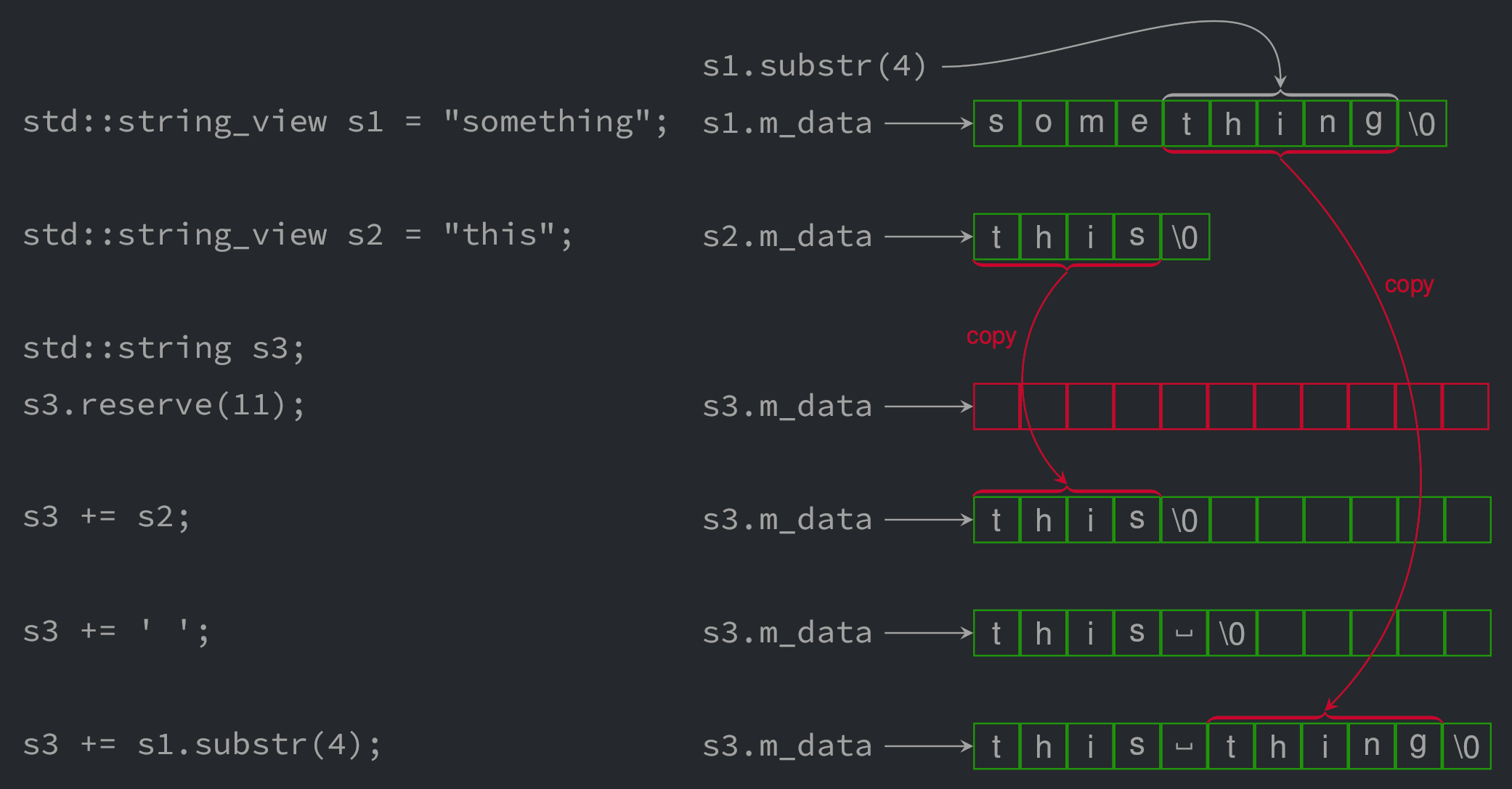
First of all, by declaring s1 and s2 as std::string_views, there
is no need to allocate a buffer and to copy the C-string; the
variables point directly to the C-strings. The only allocation here is
when we call s3.reserve(11), then all concatenations are done in
this buffer.
In the construction of the final string s3 we have a copy of s2’s
internal buffer into s3. Then a space is added at the end of
s3. Interestingly, calling s1.substr(4) does no allocation nor
copy s1’s data. This is just a temporary std::string_view
pointing somewhere in the same buffer and with a different
size. Finally, this temporary is copied at the end of s3.
We computed the same string than in the previous section, except that
we used a single dynamic allocation instead of five, and only two
calls to strcpy instead of six. Does it matter? Let’s check.
Implementing tokenize with std::string_view
Since tokenize does nothing else than extracting sub-parts from its
input string, it is the perfect candidate for a switch to
std::string_view. The change is simple:
-std::vector<std::string> tokenize(const std::string& s)
+std::vector<std::string_view> tokenize(const std::string& s)
{
- std::vector<std::string> result;
+ std::vector<std::string_view> result;
// Expect four fields in our input.
-10,2 +10,3
std::string::size_type colon = s.find(':');
+ const char* const c_str = s.c_str();
-13,3 +14,3
{
- result.push_back(s.substr(from, colon - from));
+ result.push_back(std::string_view(c_str + from, colon - from));
from = colon + 1;
-18,3 +19,3
- result.push_back(s.substr(from));
+ result.push_back(std::string_view(c_str + from, c_str + s.size()));
There are two important side effects to this change. First of all, the
signature has changed, impacting the call site and the way we manage
the tokens. In particular, concatenate_tokens has to reconstruct the
string from the std::string_views:
static std::string concatenate_tokens
-(const std::vector<std::string>& tokens)
+(const std::vector<std::string_view>& tokens)
{
std::string result;
- for (const std::string& token : tokens)
+ for (const std::string_view& token : tokens)
if (result.empty())
- result = token;
+ result = std::string(token.begin(), token.end());
else
- result += ":" + token;
+ result += ":" + std::string(token.begin(), token.end());
return result;
}
Secondly, the domain of application of tokenize has changed. By
returning instances of std::string_view pointing on the input
string, we implicitly expect the argument to live longer than the
returned objects. Previously the function returned independent
strings, so it did not matter from where the argument was coming. In
particular, code like this was previously valid and will now fail:
std::vector<std::string_view> v1 = tokenize("a:b:c:d");
// Passing "a:b:c:d" as the argument constructs a temporary
// std::string which is destroyed after the construction of v1.
// Consequently v1 contains pointers to destroyed data.
std::string get_token_string();
// A function that returns a string by value.
std::vector<std::string_view> v2 = tokenize(get_token_string());
// Here get_tokens_string() returns a temporary string, destroyed
// after the construction of v2. Thus v2 contains pointers to
// destroyed data.
Edit: as u/HabbitBaggins pointed in the Reddit thread, a solution to
avoid calling tokenize on a temporary string would be to delete the
corresponding overload:
std::vector<std::string_view> tokenize(std::string&& s) = delete;
End of edit.
That being said, let’s look at the impact of this new implementation on our program.
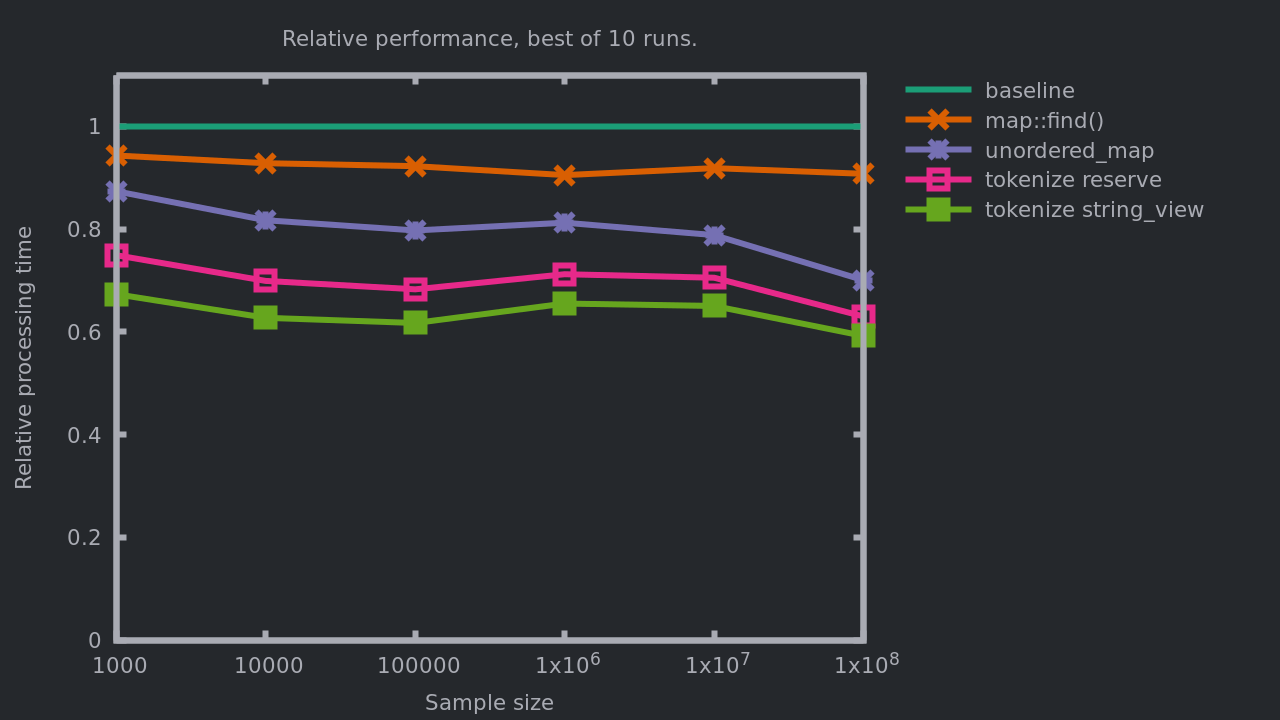
We saved up to 41% of the processing time relatively to the initial
implementation, and between 6 to 11% relatively to the previous
implementation! Let’s do a pass of perf:
- 19% in
std::unordered_map<std::string, std::string>::operator[]. - 14% in
std::unordered_map<std::string, std::string>::find. - 9% in
concatenate_tokens- Mostly in
std::string::operator+
- Mostly in
- 8% in
replace.- With
std::string::findas the top offender.
- With
- 7% in
std::getline. - 7% in
tokenize.
We managed to get a nice performance gain in tokenize but we
increased the cost of concatenate_tokens! Even though the global
performance is better, it is a bit disappointing. Since the function reached the top-three bottlenecks, let’s see if we can do something about it.
Even fewer allocations
The function concatenate_tokens builds an std::string from the
instances of std::string_view it has been passed; the std::string
is then returned. Contrary to tokenize we have to build the string,
but one can observe that the returned string is just concatenated at
the end of the result string built on the call site (in the service
function).
We previously saw that the allocations and copies have a huge impact
on the overall performance, so we are going to focus on that. What if
we skip the construction of the string in concatenate_tokens and
write directly in service’s result, i.e. what if we use an output
parameter?
static void concatenate_tokens
(std::string& result, // output parameter
const std::vector<std::string_view>& tokens)
{
result.append(tokens[0]);
for (std::size_t i = 1, n = tokens.size(); i != n; ++i)
{
// Append characters individually, no temporary std::string.
result += ':';
result.append(tokens[i]);
}
result += '\n';
}
std::string service(const std::string& in)
{
// Assume the output is not larger than the input.
result.reserve(in.size());
/* … */
concatenate_tokens(result, /* … */ );
}
The function concatenate_tokens now accepts a reference to an
std::string as its first argument. It begins by appending the first
token at the end of this string, then the remaining tokens are
appended too, each one prefixed by a colon. Finally, a line break is
inserted at the end. The main function reserves enough memory to
contain the whole input.
Let’s measure the effect on the processing time.
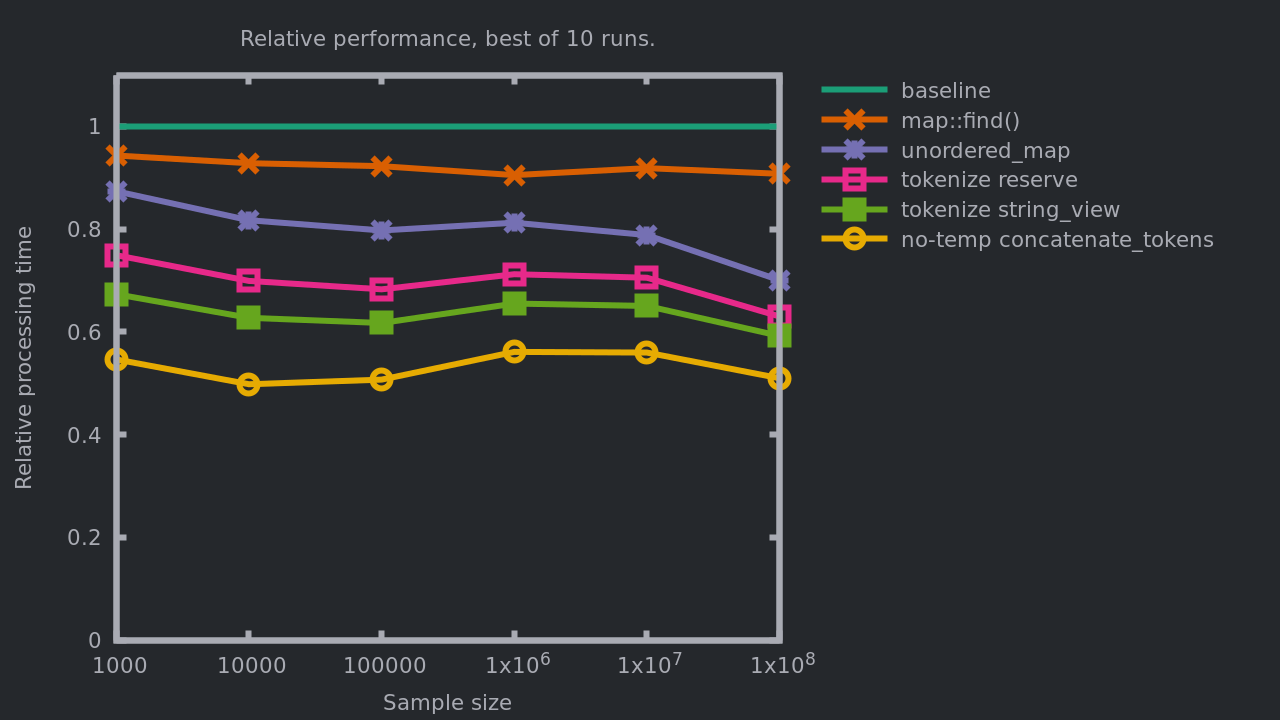
Avoiding temporary strings saved us 14 to 21% of the processing time, relatively to the previous implementation. This is also the first time that we are dividing the processing time by two relatively to the initial implementation, with a gain between 43 and 50%.
Output arguments are quite unpopular nowadays, especially with the
advances in Return Value Optimization (RVO), but here we see that they
can be quite beneficial. Hey, while we are at it, can you think of
another function where we could use an output argument? What about
tokenize?
void tokenize
(std::vector<std::string_view>& result, const std::string& s)
{
result.clear();
/* ... */
}
std::string service(const std::string& in)
{
/* ... */
std::vector<std::string_view> tokens;
// Expect at most four fields per line in our input.
tokens.reserve(4);
/* ... */
while (std::getline(iss, line))
{
tokenize(tokens, line);
/* ... */
}
/* ... */
}
Interestingly, the call to tokens.reserve(4) is probably not
required anymore. Since we are reusing the allocation for all
iterations, we could have let the default growth policy do its job for
a fixed cost of three allocations for the internals of tokens.
The measures:
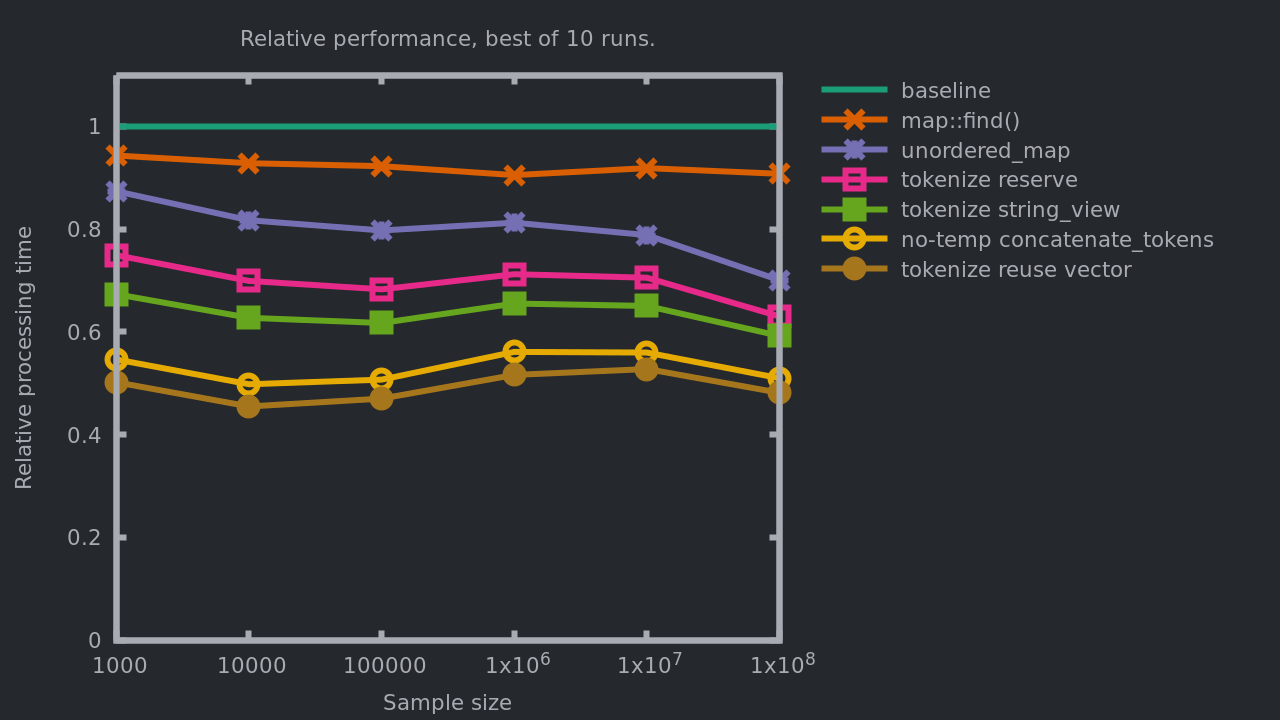
This is another 5 to 9% gain relatively to the previous implementation, and 47 to 55% relatively to the initial implementation.
Let’s look at the output of perf:
- 23% in
std::unordered_map<std::string, std::string>::operator[]. - 16% in
std::unordered_map<std::string, std::string>::find. - 9% in
replace.- With
std::string::findas the top offender.
- With
- 8% in
std::getline. - 8% in
tokenize, - 4% in
concatenate_tokens
Great, the last changes moved concatenate_tokens way down. The next
step would be replace, but first I would like to discuss about
std::getline. In its current shape the program mixes
std::string_view and std::string, making it cumbersome in some
parts, especially in the interface of tokenize. We will see below
how we can avoid std::getline, use more std::string_view, and get
even more performance gain, and yet have cleaner code.
Avoiding IO streams
The input/output library from the STL (i.e. <iostream>, <fstream>,
<stream>, and friends) is well known for having poor
performance. Yet, it is the go-to solution to process formatted
streams in C++. In our example, the specs describe the input as “one
record per line”, so it seems natural to pick std::getline to
extract the records from the input. Also, the input being an
std::string we just have to wrap it in an std::istringstream and
through the magic of well designed interfaces everything converges
toward an easy to understand algorithm:
std::istringstream iss(input);
std::string line
while (std::getline(iss, line))
// process one line
Hey, we could even process any stream with that! std::ifstream,
std::cin, isn’t it cool?
Let’s take a step back and unroll what we did. We are given an
std::string containing all the rows we need to process. This string
is immutable, it cannot change during our function. Every record we
have to handle is already present in this string, already in memory,
and they are separated by a '\n'.
The solution we chose is to copy this string in a stringstream
(i.e. one allocation plus one large memcpy), then to scan this stream
for '\n's and to copy, again, segments of this stream into
another string (i.e. we have stream management, allocation and memcpy
for each record). In other words, we have many allocations, maybe one
for each record, and the equivalent of two copies of the whole input.
What we have described in the previous paragraph is an algorithm to
extract substrings almost verbatim from another string, and covering
the entirety of this string. I say “almost verbatim” because the only
change with the input string is that '\n's are turned into '\0's.
Following what we have seen so far you should have guessed by now that
std::string_view is a solution here. Consider this alternative to
std::getline:
static std::string_view next_line(const char* &p, const char* last)
{
const char* end = std::find(p, last, '\n');
std::string_view result(p, end - p);
if (end == last)
p = end;
else
p = end + 1;
return result;
}
The next_line function takes two arguments. The first one is a
pointer to the beginning of a C-string, passed by address. The second
one is a pointer past the end of the same C-string (note that we could
have passed an std::string_view& directly to avoid implicit
dependency between the arguments). The function scans the C-string for
the first line break then builds an std::string_view with the
segment separating it from the beginning of the string. Then the
pointer to the beginning of the C-string is updated to point to the
first character following the line break, or to the end of the
C-string if there is no character left. Finally, the
std::string_view is returned.
We can update our main function to use this function instead of
std::getline:
std::string service(const std::string& in)
{
const char* cursor = in.c_str();
const char* const in_end = cursor + in.size();
while (cursor != in_end)
{
const std::string_view line = next_line(cursor, in_end);
/* … */
}
}
As a nice side effect, this also simplifies tokenize():
void tokenize
-(std::vector<std::string_view>& result, const std::string& s)
+(std::vector<std::string_view>& result, const std::string_view& s)
{
result.clear();
- std::string::size_type from = 0;
- std::string::size_type colon = s.find(':');
- const char* const c_str = s.c_str();
+ std::string_view::size_type from = 0;
+ std::string_view::size_type colon = s.find(':');
- while (colon != std::string::npos)
+ while (colon != std::string_view::npos)
{
- result.push_back(std::string_view(c_str + from, colon - from));
+ result.push_back(s.substr(from, colon - from));
from = colon + 1;
colon = s.find(':', from);
}
- result.push_back(std::string_view(c_str + from, s.size() - from));
+ result.push_back(s.substr(from));
}
As usual, a graph of the impact on the performance:
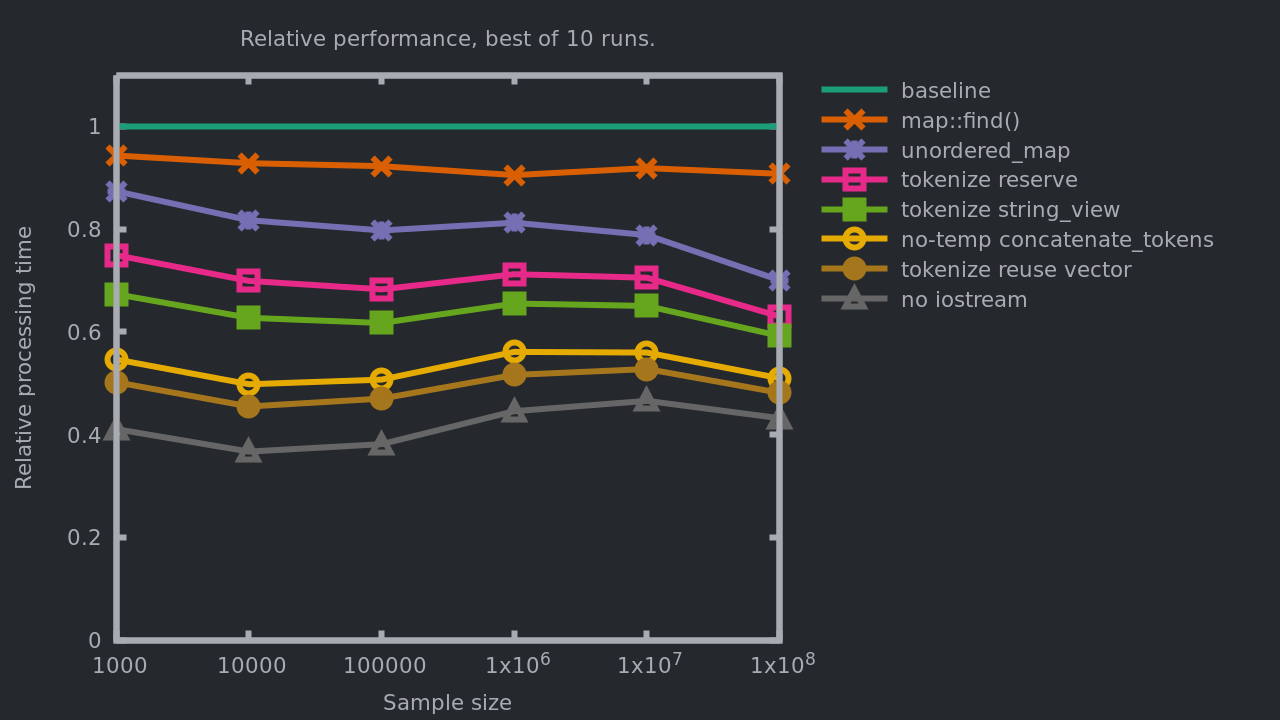
By replacing the stream-based parsing with an ad-hoc scan for end of
lines, and also by working with std::string_view instead of
std::string, we got an additional 10 to 19% performance gain,
compared with the previous implementation. Combined, all changes so
far make between 53 and 63% improvement of the initial processing
time. We divided the cost of the algorithm by two.
Let’s look at the output of perf:
- 26% in
std::unordered_map<std::string, std::string>::operator[]. - 18% in
std::unordered_map<std::string, std::string>::find. - 10% in
replace.- With
std::string::findas the top offender.
- With
- 9% in
tokenize. - 4% in
concatenate_tokens.
Funny thing, between the end of the previous page and this paragraph,
the relative cost of std::unordered_map went from 32% to 44%. It is
no surprise since we reduced the overall processing time by improving
everything but this, but since it is a large portion of the processing
time, maybe we could… you know…
std::unordered_map of std::string_view
In order to handle the "set" and "value" records, we are still
building instances of std::string from the std::string_views
returned by tokenize so we can use them in our map. If we have
learned anything in this post, it is that we should avoid
std::string if we can, so what if we store the std::string_view
directly in our maps instead? As you can see below, it makes the code
a bit lighter.
std::string service(const std::string& in)
{
/* … */
using entry_map =
std::unordered_map<std::string_view, std::string_view>;
while (cursor != in_end)
{
/* … */
else if (tokens[0] == "set")
entries[tokens[1]] = tokens[2];
else if (tokens[0] == "value")
{
const entry_map::const_iterator it =
entries.find(tokens[1]);
if (it != entries.end())
tokens[1] = it->second;
else
{
static constexpr std::string_view empty
(nullptr, std::size_t(0));
tokens[1] = empty;
}
/* … */
}
/* … */
}
/* … */
}
The graph of the impact on the performance:
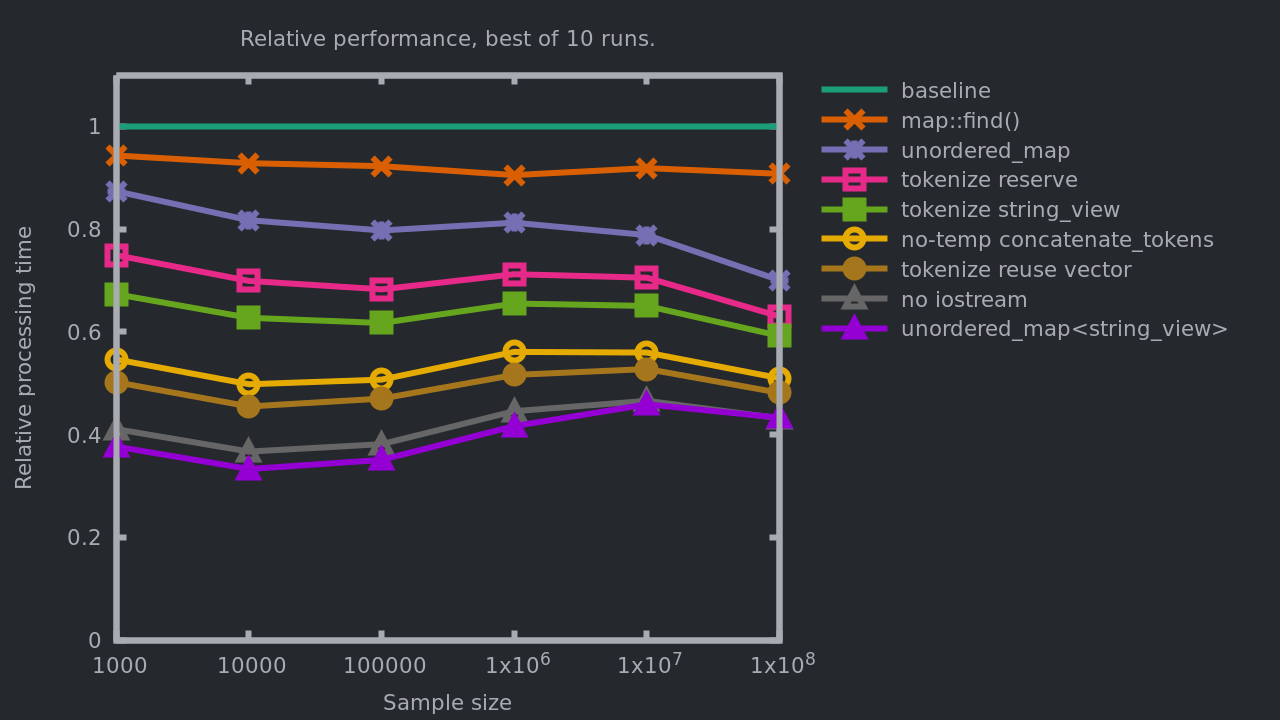
Interestingly, the modification has no significant impact on the largest instances. Otherwise it’s a win, even if it is not a huge one (and the code is simpler!). We have up to 9% gain relatively to the previous implementation, and we are reaching between 54 and 67% with respect to the initial implementation.
Back to the perf bottlenecks:
- 24% in
std::unordered_map<std::string_view, std::string_view>::operator[]. - 23% in
std::unordered_map<std::string_view, std::string_view>::find. - 10% in
replace.- With
std::string::findas the top offender.
- With
- 9% in
tokenize. - 5% in
concatenate_tokens.
The relative cost of std::unordered_map is going up again! This
means that the the savings we have just made come from what was around
it, i.e. from the removal of the std::strings built especially for
the map. Maybe these results are hiding a worsening, like if a map of
std::string_view was less efficient than a map of std::string?
Since the share of std::unordered_map::operator[] is actually a bit
down and since the call to find precedently required a temporary
std::string that we have just removed, I doubt there is any
worsening here; but you may want to measure to confirm.
This post required more effort than we had to do in the previous
ones. I consider it to be an example where taking the simple path and
expecting optimizations to happen later on the project is actually
quite expensive: It would have been cheaper and actually simpler to
use std::string_view from the beginning.
In the next and final
part we will
focus on the replace function, and also come back on these maps!